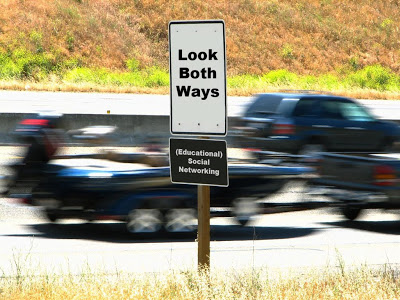Today's Teachers: Some Just Don't Give a Facebook Flickr - By Darren Draper

In my last Tech & Learning post, I discussed some of the reasons we’ve chosen to block Facebook in our schools. Since then, there have been a number of reactions to what I wrote – both in favor and against – as the conversation has continued among members of my school district, participants in the blogosphere, and throughout Twitterdom.
Among the most intriguing responses came one by Bud Hunt, wherein he explains that “filters are like any other source of power and control – they begin to become solutions to problems that they weren’t created to solve – no matter how badly they fail to solve them.” With this, of course, I agree – and admit that I hadn’t fully considered how we were using our filters to do the work that good teachers would likely do if given the chance (i.e., take a more active role in ensuring that their students remain on-task while using the Internet as a tool for teaching and learning).
Still, I wonder: Are all teachers really that good and might they be better if given adequate “training”?
Yes, sometimes. But always? No way.
I mean – yes – the best teachers can always be “trusted.” And the good ones surely can too. In fact, I'll bet that these are the teachers that we instantly think of when cussing out those "technocrats" for thoughtlessly putting filters in place to do the job that some teachers don't (or can't or won't). So what about the lower end of the bell curve that really doesn’t give a Facebook Flickr? Can’t a tired teacher get a break every now and then or should every teacher really be expected to know what’s going on in their classrooms every minute of every school day?
Hmmmmm.
(And while some might think that a good administrator might be just what the doctor’s ordered here – other administrators might just take all of the help in this department that they can possibly get.)
Tools and ideas to transform education. Sign up below.
Filters included.
Without question, however, use of Facebook and other flavors of online social networking are still on the rise. In this year’s Hype Cycle for Education, Gartner contends that social networking in education is past the “Trough of Disillusionment��� and currently climbing the “Slope of Enlightenment,” with mainstream adoption apt to take place within the next two years.
Which is why I still find David Warlick’s response to my Facebook queries particularly interesting. Wrote David:
Part of our concern seems to be about bringing into our classrooms the frivolous and sometimes unethical exchanges that seem to characterize Facebook. I have to wonder,
'Might accepting Facebook in our classroom also infect our students' social networks with more meaningful, academic, and ethical exchanges?'
Here we go again, right back to square one - and at the heart of what I consider to be the real question in all of this:
Are the personal, pre-formed networks that our students might bring into our classrooms - through Facebook, Twitter, or even their text-messaging buddies - really worth the baggage they will bring in supporting them?
If so, then we seriously need to figure this thing out (and now!).
But if not, then I continue to contend that there's really no need to use a freeway when teaching a child to cross the street.
Original image source: Flickr user jpctalbot.
